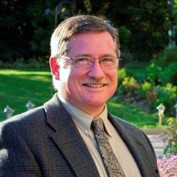
Using Biochar for Soil Repair and Stormwater Management
An interview with Chuck Hegberg, Restoration Ecologist and USBI Board Member
 Why did you pursue a career in restoration ecology?
Why did you pursue a career in restoration ecology?
I got my degrees in restoration ecology and ecological planning at the same time as a big effort was launched to clean up the Chesapeake Bay. I have been pretty much working on that for my whole career.
Philosophically, I was attracted to restoration because I wanted to help nature. Many people are focused on preservation of natural areas but humanity has damaged and degraded so much land that there is a great need to reverse that.
I have found that nature heals itself, but we can do a lot to accelerate the healing process with different environmental technologies, so a stream that might eventually heal over geologic time frames can come back to life much more quickly. Still, we are not the ones who fix it, we just remove barriers so that the biology can move in and do the work.
How does biochar help with restoration?
I first came across biochar when I was doing training work in Africa in 2006. I saw a farmer using charcoal in soil there, and I started researching biochar. A few years later I had a brainstorm about water filtration – I realized that biochar could do the same thing that activated carbon does but at a much lower cost.
It was difficult to find information on biochar, so I started working with Dr. Paul Imhoff at the University of Delaware and other researchers at Delaware State University. We created to some field projects in stream restoration and stormwater management and were able to show the effectiveness of biochar in soil decompaction and water filtration. To take on this work, I started two companies: Terra Aeration does soil repair in urban environments and Infinite Solutions is supplying biochar and blended materials for soil repair and stormwater management.
What are some of the biggest roadblocks and what does the future look like for you?
Well, the good news is that more and more people are seeing the need for soil repair to improve water infiltration and water storage in soils. Regulators are looking for solutions. But they are slow to approve biochar in these applications and we are having to demonstrate biochar benefits through performance-based metrics. We are using third-party monitoring and working on BMPs (Best Management Practices). Another barrier is a lack of biochar producers in the mid-Atlantic region. Hopefully, that will change soon.
For more information, contact Infinite Solutions.